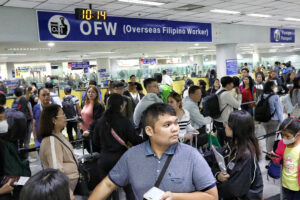
Global downturn unlikely to hurt remittance growth
By Luisa Maria Jacinta C. Jocson, Reporter
REMITTANCES will likely remain resilient this year despite an expected slowdown in the global economy, particularly in the United States, analysts said.
Oxford Economics economist Makoto Tsuchiya said he expects Philippine remittances to grow by 3% this year, slightly faster than the estimated 2.7% in 2023.
“We believe remittances are counter-cyclical in nature, so the global slowdown that we expect, particularly in the US, should not bar overseas Filipino workers (OFW) from remitting money back home,” he said in an e-mail.
The BSP expects remittance growth of 3% in 2023 and 2024.
For January to November, cash remittances coursed through banks rose by 2.8% to $30.211 billion from $29.38 billion a year ago, latest data from the Bangko Sentral ng Pilipinas (BSP) showed.
The World Bank in its latest Migration and Development brief projected remittance flows to expand by 5% to $42 billion this year.
Remittances to the Philippines alone account for about 48% of the total remittances to East Asia and the Pacific Islands, excluding China, it said.
Remittances also account for 10% of the Philippines’ gross domestic product (GDP), the World Bank said.
“I think the World Bank’s 5% (remittance growth) forecast for 2024 is a fair assessment, partly because the momentum in remittances month on month improved materially in the second half of 2023, heading into this year,” Pantheon Macroeconomics Chief Emerging Asia Economist Miguel Chanco said in an e-mail.
“Fundamentally, 2023 also saw a significant jump in overseas manpower placements, based on official statistics,” he added.
However, Mr. Chanco said the main risk to remittance growth this year is a slowdown in the US economy.
“We expect US economic growth to soften this year, which could, in turn, have a detrimental impact on its labor market and, by extension, cash transfers from overseas Pinoys in that country,” he said.
Latest data from the BSP showed that the United States was the top remittance source with a 41.2% share in January to November.
This was followed by Singapore (6.9%), Saudi Arabia (6%), Japan (5%), the United Kingdom (4.7%), United Arab Emirates (4.3%), Canada (3.6%), Qatar (2.8%), Taiwan (2.7%) and South Korea (2.5%).
Mr. Tsuchiya said he does not expect a “very strong surge” in remittances this year.
“First, we expect the Philippines to post a healthy growth of 4.9%, only slightly slower than 5% in 2023. While this is low by the Philippines’ standards, it is not too weak to entice higher remittances when the rest of the world where OFWs are based are suffering more,” he said.
The government is targeting 6.5-7.5% growth this year.
“Second, recent surveys suggest the share of households that use remittances for savings rose to 37.6% in 2023 from 33.6% in 2022. In fact, the figure in 2023 is higher than 35.7% in 2019, before the pandemic. This means there is currently no urgent need for OFWs to remit their money in a hurry,” Mr. Tsuchiya added.
Ateneo de Manila economics professor Leonardo A. Lanzona said higher remittances are normally expected during periods of economic difficulty.
“Since economic growth is not expected to increase significantly this year due to various constraints, including El Niño, one would expect remittances to fill in the gap between the incomes and consumption needs of households,” he said in an e-mail.
The World Bank report noted that remittance inflows could also be used to help support the country’s debt management due to their “large size relative to other sources of foreign exchange, countercyclical nature and indirect contribution to public finances.”
Mr. Chanco said more dollar remittances coming in would help “service external debt obligations denominated in foreign currency, mitigating any strains on the exchange rate.”
“I’d be wary, though, if the government starts to see these inflows as a potential source of tax revenue to help service public debt, as implementing any sort of such levy might have a structural impact on the level of inflows thereafter,” he added.
Mr. Lanzona said remittances are unlikely to help address the country’s debt problem.
“Remittances are only limited to meeting the households’ debt and social security which is lower than the country’s debt obligations. Hence, it is unlikely that it will be sufficient in solving the country’s debt problem,” he added.



